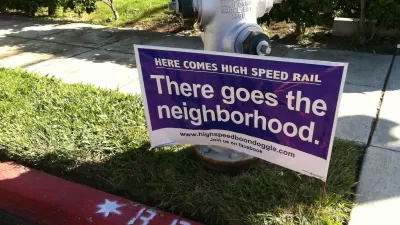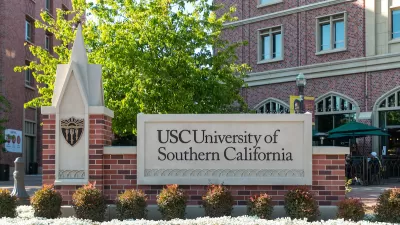In case anyone thought that developers were the only bad actors seeking to profit off of contentious projects, confidential settlement terms leaked to Curbed show how local groups abuse the California Environmental Quality Act for dubious gains.

In a scathing article, James Brasuell uses a confidential settlement agreement between a developer and a local homeowners' group in Los Angeles to demonstrate "a practice sometimes called 'greenmail,' in which businesses and homeowners groups use the threat of CEQA-based lawsuits to generate cash from developers for things that have nothing to do with the environment."
The settlement, which was leaked to Brasuell by an anonymous source in City Hall, discloses how the La Mirada Avenue Neighborhood Association was able to wrestle $90,000 for "La Mirada's costs, and attorney's fees and costs" and "a monitoring payment" of $250,000 "to be used as La Mirada sees fit," from an unnamed developer in exchange for promises not to oppose a project.
"The document provides hard evidence for this common practice," says Brasuell. "'We absolutely don't know what happens with the money. Typically in a settlement, there is no limit on how much money or what the money can be used for,' says Jennifer Hernandez, partner at the firm Holland & Knight....Hernandez describes the lawyers who seek financial sums unrelated to the laws that they are suing under as 'bounty hunters.'"
"The greenmail problem, Hernandez notes, is unique to California's backwards use of a statute like CEQA: 'In other states and under NEPA [a federal law similar to CEQA], if your interests are primarily economic, you cannot sue under an environmental statute ... California has gone in a remarkably different direction."'
FULL STORY: Leaked Settlement Shows How NIMBYs "Greenmail" Developers

Planetizen Federal Action Tracker
A weekly monitor of how Trump’s orders and actions are impacting planners and planning in America.

Map: Where Senate Republicans Want to Sell Your Public Lands
For public land advocates, the Senate Republicans’ proposal to sell millions of acres of public land in the West is “the biggest fight of their careers.”

Restaurant Patios Were a Pandemic Win — Why Were They so Hard to Keep?
Social distancing requirements and changes in travel patterns prompted cities to pilot new uses for street and sidewalk space. Then it got complicated.

Platform Pilsner: Vancouver Transit Agency Releases... a Beer?
TransLink will receive a portion of every sale of the four-pack.

Toronto Weighs Cheaper Transit, Parking Hikes for Major Events
Special event rates would take effect during large festivals, sports games and concerts to ‘discourage driving, manage congestion and free up space for transit.”

Berlin to Consider Car-Free Zone Larger Than Manhattan
The area bound by the 22-mile Ringbahn would still allow 12 uses of a private automobile per year per person, and several other exemptions.
Urban Design for Planners 1: Software Tools
This six-course series explores essential urban design concepts using open source software and equips planners with the tools they need to participate fully in the urban design process.
Planning for Universal Design
Learn the tools for implementing Universal Design in planning regulations.
Heyer Gruel & Associates PA
JM Goldson LLC
Custer County Colorado
City of Camden Redevelopment Agency
City of Astoria
Transportation Research & Education Center (TREC) at Portland State University
Camden Redevelopment Agency
City of Claremont
Municipality of Princeton (NJ)





























